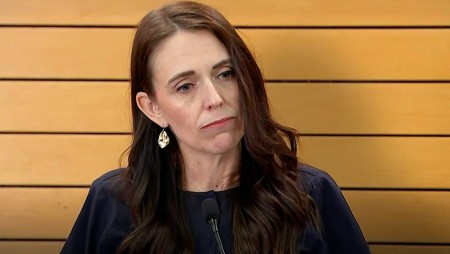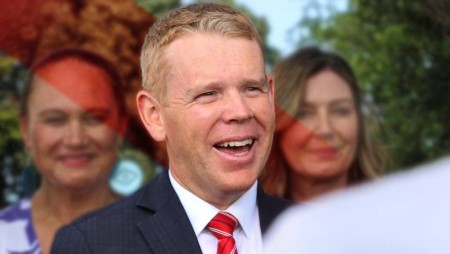Stuart Nash, white cis men, bus drivers, Jacinda Ardern
ANALYSIS: The Prime Minister is still dealing with the fall-out from Nash’s breach of the Cabinet Manual.
NBR columnist Grant Walker speaks with Brent Edwards.
ANALYSIS: The Prime Minister is still dealing with the fall-out from Nash’s breach of the Cabinet Manual.
NBR columnist Grant Walker speaks with Brent Edwards.
In the past week or two, Prime Minister Chris Hipkins might have thought he would get time to take stock of his sudden elevation to the top job at the beginning of the year.
Since Jacinda Ardern announced her resignation in January and Hipkins succeeded her, he has hardly had time to draw breath as he dealt with the leadership transition, flooding and a cyclone, and a host of the usual political challenges at the start of the year. Just when he might have taken a deep breath, the Stuart Nash saga broke out. It started with Nash revealing he had rung the Police Commissioner Andrew Coster to urge him to appeal a court judgement. That is a no-no for a Cabinet minister, even though Nash was not police minister at the time.
Then other examples of less-than-exemplary ministerial behaviour came to light, but Nash held on to his Cabinet post, even though he lost the police portfolio and was demoted down the rankings to No 20.
Each time it occurred, Hipkins asked Nash if there was anything else he should know about, and the minister assured there was nothing else.
Then, this week, it emerged Nash had sent an email to two of his donors in 2020 complaining about a Cabinet decision on commercial rent relief as part of the Government’s Covid-19 economic response. He breached the Cabinet Manual on two points: first, ministers are not meant to disclose what goes on in Cabinet meetings to outside parties. Second, once a decision is made, collective responsibility means every minister must accept and back the decision.
This breach marked the point of no return for Nash, and he was promptly fired by Hipkins.
Then the Prime Minister revealed that the fateful email from Nash to two of his political donors had been seen by the Prime Minister’s Office in 2021 as part of an Official Information Act request. The email was not released because it was deemed out of scope of the OIA.

Former Prime Minister Jacinda Ardern did not see the contentious email.
But, if the PMO saw the email, why did former Prime Minister Jacinda Ardern not act on it then?
Hipkins says while the email was in the PMO neither she nor her chief of staff saw it. Apparently, whoever did deal with it did not deem it serious enough to raise with people above them in the food chain.
Since the Beehive Banter video with NBR presenter Grant Walker was recorded, Hipkins’ office has released more detail of how the email was dealt with. In fact, the PM’s deputy chief of staff Holly Donald and another senior adviser were aware of it but did not raise it with either the chief of staff or Ardern. Both have apologised and still work in the office.
Hipkins says he had accepted their apologies.
“Staff in the Prime Minster’s Office deal with large volumes of information every day and errors of judgement do occur. However, I’ve made my expectation clear and don’t expect such an error to occur again,” he says.
The PMO also released more detail about the OIA into the email and other communications Nash had with his political donors.
He sent his email to Greg Loveridge and Troy Bowker on June 5 after the Government announced it would temporarily amend the Property Law Act to insert a clause in commercial leases requiring a fair reduction in rent. On July 8, his office received an OIA request for all written correspondence between him and a list of individuals. This was discussed by staff in PMO on at least three occasions.

Former minister Stuart Nash.
In June 2022, Nash’s office received a letter from the Ombudsman regarding an investigation into his response to the OIA. Later that month, he replied and included a redacted version of the email with an explanation he had sent it in his capacity as an MP, not as a minister. In May, the Ombudsman’s office informed Nash’s office that its investigation was closed, and they were not pursuing the complaint.
It does seem extraordinary, though, that Nash could get away with claiming he was acting as an MP, when he had been at the Cabinet meeting that made the decision he then railed against.
Meanwhile, Hipkins has announced a review of all Nash’s communications to determine whether this incident is the last instance of his casual approach to adhering to ministerial standards. It largely bats off a demand from National Party leader Christopher Luxon for a full investigation into the matter, although Luxon wants communications of all ministers examined.
The National Party leader also believes there should be a by-election in Napier and that Nash is no longer fit to remain an MP. But Nash’s breaches have been of the Cabinet Manual, making it a matter for Hipkins to decide whether he continued to have confidence in him as a minister. This does not go to Nash’s fitness as an MP and the decision on whether or not to resign from Parliament is solely one for him to make, no-one else.
But Walker asks how effective Nash will be as MP for Napier: “Who will listen to him? Whose ear will he have?” he says.
While Nash has fallen from grace, he has not entirely fallen out of favour. Most of his colleagues view his demise with sympathy, believing he acted stupidly but not maliciously. It seems likely he will still have the ear of colleagues, even senior ones.
Nash himself argues now is not the time to step down as Napier continues its recovery from Cyclone Gabrielle. As it is, if a new MP were elected they would only be in the job a matter of weeks before the general election.

Green Party co-leader Marama Davidson.
The Opposition is also continuing to put pressure on the Government over Green Party co-leader and Minister for the Prevention of Family and Sexual Violence Marama Davidson’s comments blaming white cis men for the violence.
Davidson clarified her comments on Monday, saying she was still in shock, after being hit by a motorcycle, when she made the comments to far-right and conspiracy website Counterspin.
“I should have made clear in my comments that violence happens in every community. My intention was to affirm that trans people are deserving of support and to keep focus on the fact that men are the main perpetrators of violence,” she said.
Her clarification came after the Prime Minister’s Office – at Hipkins’ behest – contacted Davidson’s office raising concerns about the matter and clearly wanting a clarification made before he held his weekly post-Cabinet news conference on Monday afternoon.
But, while she clarified her comments, Davidson refused to apologise, even as Luxon demanded she do so.
Walker asks how Hipkins can stop these missteps by ministers making him look soft, as well as being distractions for the Government.
In both cases, however, Hipkins has dealt with the matter, both in sacking Nash and getting Davidson to walk back her original comments.

Prime Minister Chris Hipkins.
And, while they are distractions for the Government, the incidents also risk being distractions for the Opposition. By the time of the election, neither episode is likely to figure highly in the minds of voters more worried about putting food on the table and being able to afford the rent or their mortgage payments.
A new Kantar poll, released in conjunction with the Sustainable Business Council, found 72% of respondents named cost of living as their top concern. If Opposition parties become distracted by these ministerial brouhahas – and news media coverage of them – they may look as though they are not focused on the issues that matter most to voters.
Meanwhile, bus drivers have been given the go ahead to negotiate the country’s first fair pay agreement. It comes after the Government had already committed $61 million in last year’s Budget to raise the standardised minimum rate for drivers to $30 an hour for urban services and $28 an hour for regional services.

Bus drivers have the go-ahead to negotiate a fair pay agreement.
“This will help the industry transition to standard terms and conditions for bus drivers, which currently vary widely throughout the country,” Transport Minister Michael Wood said last October.
That budget increase should presumably help make the negotiation of a fair pay agreement for bus drivers just that little easier to achieve. It is not clear though whether the FPA can be negotiated and signed before the election, with National promising to scrap the FPA legislation should it form the next government.
Next week marks a short week before Parliament goes into recess for the Easter and school holiday break. It will be marked, though, by Ardern’s valedictory as she bows out of politics after almost 15 years.
She was elected in 2008, the same year as her successor Chris Hipkins, Finance Minister Grant Robertson, Deputy Prime Minister Carmel Sepuloni, Children’s Minister Kelvin Davis, and former ministers Phil Twyford and Stuart Nash. All will have a particular interest in what she has to say next Wednesday. But don’t expect her to comment on the Nash affair.
Brent Edwards is NBR's political editor.
Sign up to get the latest stories and insights delivered to your inbox – free, every day.